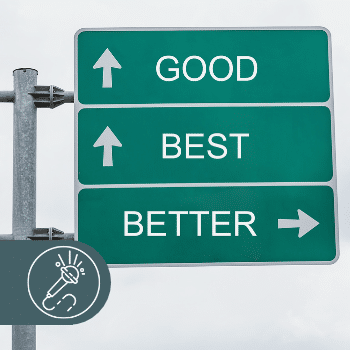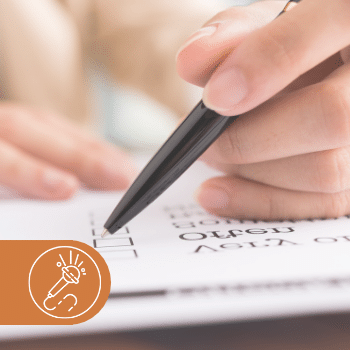Operation: Interview
Everyone has a story
This month we are going to be conducting a professional family history interview, but in bite size pieces! You’ll see how easy it is to master interviewing with these easy to follow steps. The outcome will be a rich life history of one of your living relatives! Don’t worry, we walk you through picking who to interview, how to ask them if you can interview them, what questions to ask, what equipment to use and what to do after the interview. This month is all about Living family connections as you discover new family stories and crush it with interviewing!
Jump ahead to the day you’d like to see.
Be sure to take the pre experiment survey before you start and come back and complete the post experiment survey when you are done.
Day 1

Why interview?
One of the best ways to get information about your family is living relatives. You can get this information or family stories from them in an interview. When most people pass away, their family or friends wish they had asked more questions about that person, don’t let that be you! While you are interviewing your family members you will also be building a bond with that person, and developing your listening skills. Write down why you want to interview your living family members.
Day 2

Who to interview?
Think outside the box when thinking of who to interview. Instead of interviewing just your grandparents, think of their siblings, or your siblings, or your parents or their siblings. Everyone has a story and a unique view of events. List all your family members that are alive. Star the ones you’d like to interview sooner than later, then pick one to start out with.
Tip: We suggest you start with the oldest family members first since they are more likely to pass away first or forget more details.
Day 3

Pop the question
Asking your relative if you can interview them is very intimidating for most people. We’ll walk you through what you need to do so hopefully you feel confident and ready to ask them for an interview. Before you make the call you need to come up with a plan. Decide how long you want the interview to be and if you need to do more than one session. Realize you won’t get a full life history in one session. Pick a location to do the interview, think of their house or your own house.
Now call and ask them if they would be willing to do an interview with you. Tell them some of the reasons you’d like to interview them. Then, when they say yes, present the place you are thinking and ask what time works best for them. Your goal is to get their consent to interview, share their story, and know where and when you are meeting when you get off the call.
Day 4

Gather the Basics
Your time with your interviewee is precious. So don’t waste your time asking them what you already know. Gather basic information about your interviewee before the interview. For example, gather interviewee’s, parents’ and siblings’ full names. Important dates such as birthdays, marriages and deaths. It may be helpful to start a timeline adding all these dates.
Day 5

Gather the history
Big events in the world affect your living relative’s life. It may change how they think about their life, family members or a group of people. Looking up these events will help you when you form your questions later. Look up big historical events that would affect your living relative’s life. Add these to your timeline to fill in more information.
Day 6

Add your memories
Your interviewee is a member of your family, so you must have memories or stories of this family member! Write these memories down. You will be able to verify the details and then be able to get your living relative’s point of view.
Day 7

Involve others
Your other family members may have questions that you won’t think of. They may have been alive before you were and have a longer history with your interviewee. Since it’s not recommended to have many people there, it’s best if you ask all the questions. Ask other family members for questions to ask, stories to verify, etc.
Day 8

Good, Better, Best
How you structure your questions is important. Look over the last 4 days and write down questions that you’d like to ask. This is brainstorming time so just write them down. Make sure your questions are open ended. If you need some more inspiration you can look up questions on the internet.
Tip: Don’t like coming up with questions? Check out our product, the Keepsake journal and just ask the questions in there.
Day 9

Finalize questions
During your interview you probably won’t ask all your questions, either you’ll run out of time or the conversation is flowing so well you won’t need to ask the questions! Go through your brainstorm list from yesterday and finalize the questions you would really like to ask during your interview. When you are done send a few questions or themes to your interviewee so they can prepare. Don’t send your whole list of questions, they might just go down the questions like a checklist and you want a conversation.
Day 10

Spark memories
Physical items can be memory prompts that trigger memories that questions can’t. Your interview may help you label pictures (who, what and where) or learn the story behind an item. Items don’t have to deal directly with the interviewee, think of photos with siblings or parents, or items that belonged to a related family member. Collect photos, heirlooms or memorabilia that will spark conversations or memories they can share.
Day 11

Equipment 101
The interviews you are doing should live on years afterward. In order to have this happen you need quality equipment. Decide if you will do just an audio interview or if you will also video it. Here is a brief list and details of the equipment you should look into getting.
Equipment
- Lapel mic
- Phone apps
- Voice recorder
- Video recorder
- Hard drive
- Extended memory
- Light (if doing a video)
- Tripod (if doing a video)
Buy or rent the equipment you will need for your interview. Make sure you will have the equipment in enough time to make sure they work and you understand how to use it.
Day 12

Final Preparations
Before the interview, set up your equipment to see how everything works and trouble shoot anything that might come up. If you are videoing your interview make sure you check the lighting. Of course make sure your batteries are all fully charged and that your memory cards have enough memory to record your interview. Also, bring some backups of your batteries and memory cards.
Day 13

Interview checklist
Today’s the day of the interview. Here’s the checklist you need to complete to get ready for the interview and of course during the interview.
- Make sure you arrive on time.
- Set up your equipment
- Video:
- Set up video camera and tripod
- Make sure it’s not right in interviewee’s face
- Check light
- Record a few seconds to see if there is any background sound
- Check batteries and storage settings
- Set up a voice recorder just in case
- Take some notes just in case something happens
- Audio:
- Set up audio recorder
- Apply the mic (If you have one)
- Record a few seconds to see if there is any background sound
- Check the batteries and the storage settings
- Set up another voice recorder just in case (Your phone?)
- Take some notes just in case something happens
- Video:
- During the interview:
- Don’t pay attention to the recording equipment or you’ll distract your interviewee and may make them self-conscious
- Relax and have fun!
- Don’t interrupt your interviewee
- Let the conversation flow
- Afterwards:
- When you get home make sure to make a copy and put it on the cloud
- Make another back up and put it on a hard drive (the point is to have multiple backups in case one fails)
- Come up with a name filing system
Day 14

Think to Thank
Your interviewee probably stepped out of their comfort zone to talk to you about themselves. You probably got a lot of valuable information that will help you in the future. You need to make sure your interviewee understands how thankful you are for what they did for you. Write them a note or even get them a gift! When you are all done editing and transcribing your interview with them, make sure you give them a copy.
Day 15

Transcribe
Transcribing your interview will provide a paper back up. It will also help you process what you heard and you may even come up with more questions to ask. You can transcribe the interview yourself or use a company. Start with writing it in a script form. Then you can write it in first person (in the interviewee’s view).
Day 16

Proofread
Before you are done with the transcription or first person write up, have it proofread. Make sure the interviewee reads it. They can clarify stories or add details that they missed. Also, have someone else proofread it so you can get an outsider’s opinion on it making sense and the grammar.
Day 17

Follow Ups
Follow up interviews are a great idea to fill in details. These can be over the phone or in person again. The in person ones can be another session (1 ½ – 2 hours). It can even be one or two questions for clarification.
Enjoying this 21 Day Plan?
Day 18

Make it Bite size
No one wants to read a huge book about anyone. Make your interviewee’s life story bite size. One way to do this is to split the life history into topics or themes. (But don’t replace the transcript!!! Create different documents) Some ideas are:
- Childhood
- Jobs
- Religion or belief
- World Events (Wars, national events)
- Honesty
- Hard work/rewards
- Love
- Family
- Hobbies
Day 19

share share share
Now that you are done with transcribing the interview and making the life history bite size, it’s time to distribute it! You can wait until the holidays to give printed books out to family as gifts. You could just share a link to where the stories are stored (make sure they are saved in multiple areas). You could share a story every week by email, letter or on social media with your family. You can also add stories that contain passed family members into FamilySearch Memories or added to your tree on Ancestry.
Tip: On day 3 you asked your interviewee for permission to share their story. It’s a good idea to make sure they are still ok with it.
Day 20

Mix it up
Great job with the traditional interview! Now, try these other past memory gathering ways, just remember to record them in anyway you can:
- Sibling interview/group: Grab a group of siblings (or another group) and have them sit in front of the camera while you ask them questions. They will feed off each other and remember more.
- Dinner table stories: Use your time at the dinner table (think holidays and everyday dinners) to gather memories! We have a great dinner conversation generator to prompt those memories! Here’s the generator.
- One memory a week: Use social media, emails or letters to ask your relative(s) to share certain memories each week. You can use our speed interview questions (without the speed), questions from lists on the internet or FamilySearch’s 52 stories prompts.
- Email/letters: Write emails and/or letters with your family members asking them questions about their life. Don’t overwhelm them with your questions. Just ask a few so they can return the answers in a manageable letter.
- Photos: Use photos to prompt memories with your family members. You can do this at family reunions, get-togethers or take advantage of social media.
- Topics: Come up with a topic you want to find out more about with your family and ask everyone about it. For example: ask all your aunts and uncles how they met their spouse(s). Ask what they know about their parents meeting. Ask what their advice is for their 18 year old self or their 18 year old kid.
- Kids ask: Kids have a way to come up with great questions that they really want to know the answer to. While you are in the car, have them ask their questions to their parents or grandparents. This can also happen at bedtime.
Let us know on our social media what ones you are going to do!
Day 21

Keep it going
Try these other non-tradition interviews to gather your family’s memories going forward. Just remember to record them in anyway you can:
- All about me sheets: Have a set time for you and your family to fill out all about me sheets. You can do this once a year, at every family reunion (with extended family) or whenever it works for you.
- Yearly interview: Every year have a tradition to do a yearly interview with your family members. Since it’s yearly they won’t be long. Video or voice record it. Have set questions you ask every year or ask different ones.
Let us know on our social media what ones you are going to do!



